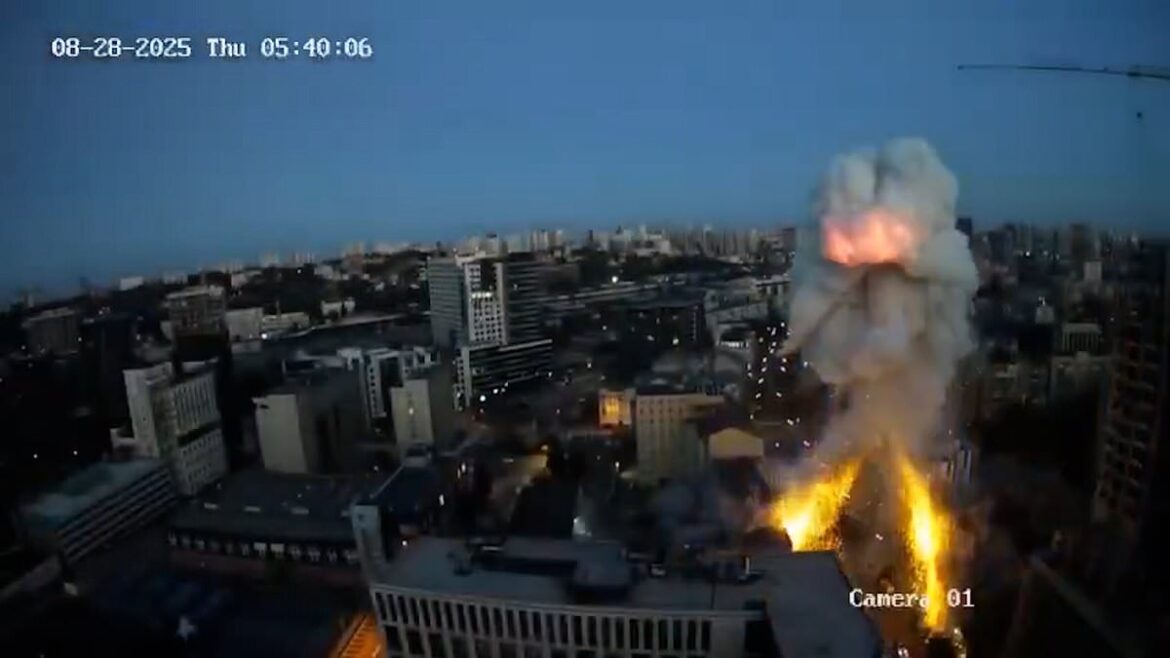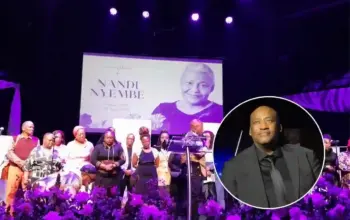Kyiv residents were jolted awake in the early hours as a relentless Russian assault tore through the Ukrainian capital, hitting key buildings that could have endangered British and European staff.
The attacks came just hours before British Council employees would have arrived for work, narrowly avoiding what could have been a catastrophic loss of life.
British Council and EU Offices Caught in the Crossfire
In a shocking double-tap strike, Russian forces targeted the British Council’s Kyiv office and the European Union delegation headquarters.
Dramatic footage showed one missile hitting around 5:40 a.m., followed by a second just 20 seconds later, leaving both buildings severely damaged.
The British Council, which runs English language and educational programs supported by the UK Foreign Office, recruits staff from the UK—many of whom would have been inside the building later in the morning.
European Commission President Ursula von der Leyen condemned the attack as “deliberate,” accusing Moscow of specifically targeting EU facilities.
Political Leaders Condemn Putin’s Escalation
UK Prime Minister Keir Starmer denounced the strikes as “senseless,” accusing Vladimir Putin of undermining any hopes for peace.
Ukrainian President Volodymyr Zelensky echoed these sentiments, emphasizing that the attacks prove Russia remains unafraid of consequences.
While no EU staff were injured, a security guard at the British Council was hurt, and civilians across Kyiv suffered as Russia launched 629 drones and missiles—including hypersonic rockets—marking the second-highest assault of the war.
A Longstanding Campaign Against the British Council
Russia has long viewed the British Council as a threat.
Since 2007, Moscow has pressured for closures of Council offices in St. Petersburg and Yekaterinburg, citing tax issues, while also harassing staff.
Dmitry Medvedev, then Russian president, openly called the organization a “secret weapon” for Britain’s global ambitions.
In 2018, the British Council was forced to cease operations in Russia entirely, and by June 2025, it was officially labeled an “undesirable organization,” criminalizing collaboration with Russian citizens.
Diplomatic Fallout and Western Response
Following the strikes, the EU summoned Russia’s envoy in Brussels, with officials warning that no diplomatic mission should ever be a target.
Kaja Kallas, the bloc’s foreign policy chief, described the attacks as a clear attempt by the Kremlin to terrorize civilians and undermine international norms.
The UK Foreign Office called the strikes “outrageous” and warned Moscow that such actions will only strengthen Western resolve to support Ukraine.
The Russian ambassador was summoned to discuss the attacks and their implications.
Streets in Ruins as Residents and Rescue Teams Respond
The morning after the assault, Kyiv’s streets were littered with rubble and shattered glass.
Videos posted by Zelensky showed a five-storey crater splitting an apartment building in two.
Rescue workers and heavy machinery combed through the debris, with some residents still feared trapped beneath the wreckage.
A local man recounted how he narrowly escaped being buried alive.
Meanwhile, Ukrainian forces reportedly targeted Russian refineries in Samara Oblast and Krasnodar Krai in retaliation, demonstrating that hostilities remain unrelenting.
Zelensky Demands Accountability and Stronger Sanctions
Zelensky denounced the strikes as a “horrific and deliberate killing of civilians” and called on allies to impose harsher sanctions.
He urged countries like China and Hungary to adopt tougher stances against Moscow, stressing that Russia must be held accountable for each day of ongoing violence.
Despite the attacks, the Kremlin insisted that it remains open to negotiations, though Russian spokesman Dmitry Peskov confirmed that military operations would continue.
Kyiv Faces Record-Level Assaults Amid Failed Peace Talks
Once relatively protected from air attacks, Kyiv has recently endured increasingly deadly strikes.
Last month alone, more than 30 civilians, including children, were killed.
Among Thursday’s victims was a 14-year-old girl, highlighting the indiscriminate nature of the Russian attacks.
Putin has repeatedly dismissed ceasefire proposals from Zelensky, former US President Donald Trump, and European leaders.
Ukraine, meanwhile, continues to insist that Western security guarantees must precede any peace deal to prevent future aggression.
Ukraine Pushes for Stronger US Support
As Kyiv seeks international backing, Zelensky’s top aides are set to meet Trump’s team in New York, aiming to secure robust US support for Ukraine’s defense.
The outcome of these discussions could shape the next phase of the conflict, as Russia continues to exert military pressure on civilian areas and diplomatic targets alike.



